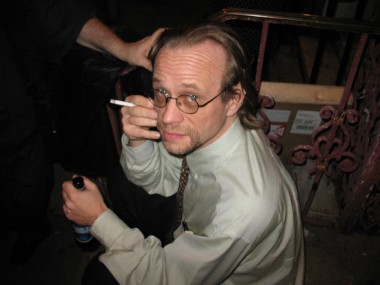Death of the theatre critic?
Wednesday 1st July 2020

This is the age of marketing, not the age of criticism. To give an example, I’ll start with a small incident that has a wider symbolic value. In November 2013, a new show called Gastronauts opened at the Royal Court’s Theatre Upstairs. It was an immersive theatre experience during which the audience “dined” in a “restaurant” space. Billed as a “theatre adventure with food and music”, critics were invited to review the show on two nights (27-28 November) because of the small capacity of the venue. Our reviews were strictly embargoed until Friday 29 November. In the event, on the morning of the day before, Thursday 28 November, BBC Radio 4’s flagship early morning Today programme ran an item which both reported on the show and included a favourable review by Giles Coren, a celebrity restaurant critic. Does this count as breaking the embargo? Or is it just good news management by the theatre? Of course, the fact that theatres are better than ever at marketing is not surprising. But sending a restaurant critic to review a show is surely a new low. What next: an army general to review Macbeth? A Saga writer for King Lear? An Olympic fencing champion for Hamlet?
Critical Profession
In the past five years, in the UK, the balance has tipped decisively against the professional critic. He or she is now as doomed as the legendary Dodo, and there are several reasons for this fate. But before looking in detail at these it might be worth specifying what is meant by the term professional critic. One hundred years ago, when the UK Critics’ Circle was first set up in 1913, membership was quite open, but gradually — over the years — one important criterion emerged: the professional critic was a man or woman who made most of their living as a paid reviewer of theatre shows. Their usual employer was a daily or Sunday national newspaper, or a regular weekly magazine, and this system of permanently employed regular critics lasted for more than five decades after the end of the second world war in 1945. This was the era of Harold Hobson and Kenneth Tynan, BA Young and Irving Wardle, TC Worsley and Ronald Bryden, Michael Billington and Benedict Nightingale. Of Jane Edwardes and Lyn Gardner. Together, they created the public conversation around theatre as an art form, and their reviews were regularly enjoyed by the readers of their publications.
The great advantage of this system was stability and consistency. These critics reviewed the main shows, mainly in London but also outside, almost every day, week in and week out. It was not unusual for them to see six or seven shows a week. Eight even. The fact that they were regularly employed meant that they had complete independence and were supported by their publication’s editors. They didn’t have to compromise or to mince their words — their economic independence guaranteed the integrity of their point of view. The stability of this system enabled them to build up enormous experience and allowed them to make comparative judgments about the quality of playwriting, standards of acting and design in performance, and encouraged them to make informed generalisations about the state of the theatre arts in this country. Often, their longevity gave them a deep temporal perspective: they could compare productions across the decades. Although British critics were essentially journalists, and rarely if ever had studied the theatre arts at any university or conservatoire, their enthusiasm meant that their practical knowledge was usually sound and often compelling in its viewpoint.
Signs of Strain
This system began to come under strain in the 1990s. Although the core of permanently employed theatre critics remained stable, there were signs of change. The first tension was the decision of some editors to employ celebrities rather than experienced critics to review shows. So a celebrity journalist such as Toby Young, with no experience of theatre, was employed by the Spectator magazine to be their critic; the Daily Mail newspaper now employs its parliamentary sketch writer, Quentin Letts, to cover theatre. At one point an actress, Nichola McAuliffe, did a stint as this publication’s reviewer. When Benedict Nightingale retired from The Times in 2010, his place was taken by Libby Purves, a radio personality. In turn, she has recently been sacked. Other publications, from the Sunday Times to the Sunday Telegraph, have employed non-specialists as critics. These changes may have resulted in reviews whose style amused their readers, but their work has not been based on a lifelong passion for theatre, nor on great experience of it as an art form. A similar phenomenon has afflicted television and radio: where once BBC television had a regular daily late-night arts review show, The Late Show (1989-95), this gradually became a once-a-week event, before finally in 2013 being hidden out of sight on the BBC Four channel and broadcast only once a month. Similarly, BBC Radio 4’s Front Row programme, as well as BBC Radio 3’s Night Waves, often prefer to ask a whole variety of other arts people, from actors and comedians to novelists, poets and artists (in fact anyone apart from a professional critic) to review arts events. The net effect has been the same: celebrity culture has triumphed over specialist knowledge.
Darling Dodos
Of course, the general crisis in British journalism has deepened in the past decade. With falling sales and collapsing advertising revenue, many newspapers and magazines are now vulnerable to closure, and the future of all specialist journalism is in doubt. It’s only a matter of time before critics go the way of foreign correspondents (one of the first victims of newspaper cutbacks). A decade and more of the proliferation of 24-hour media outlets, from television and radio to the internet and social media, has delivered the coup de grace to traditional print. Who wants to wait until breakfast to get the news? And why bother to buy a newspaper if you can read the same content online for free? So the falling revenues of these time-honoured employers of theatre critics is the one factor that means it is sure that the days of the traditional critic are numbered. In the USA, theatre critics have disappeared from many publications, especially in local media. As David Cote, theatre editor of Time Out New York, wrote in 2011: “Economic contractions since the 2008 financial crisis have only exacerbated conditions for the regional theatre critic. Downsizing, merging and digitizing content have all taken a toll on media owners, who are constantly looking for ways to cut corners. Reviewers who are left on staff must do everything in their sections: write preview pieces, review those same artists, blog, tweet and keep an eye on trends in their fields. Burnout is almost inevitable.” If, he notes, redundancy doesn’t get you first. And, in September 2013, this tendency finally arrived in the UK: the Independent on Sunday announced that it was sacking all of its arts critics, including the long-serving specialist theatre critic Kate Bassett. Instead, they now print preview pieces, as well as summaries of theatre criticism from other newspapers!
New Media
Despite these trends, it is clear that theatre still thrives on its conversation with audiences, and that the new media has greatly expanded the range of this cultural conversation. Website reviewing has increased: look at the websites of What’s On Stage and British Theatre Guide, The Arts Desk and West End Whingers, TNT Magazine and Curtain Up, Spoonfed and Exeunt, Everything Theatre and The Upcoming. And there are many others. Bloggers, such as Mark Shenton, Michael Coveney, Matt Trueman, Natasha Tripney, Samantha Ellis, Megan Vaughan and Andrew Haydon, and George Hunka in New York as well as Alison Croggon in Australia, have become part of an international exchange of ideas. The feminist Jill Dolan reviews theatre and films on her site. Practitioners, such as Hannah de Silva, Chris Goode, David Eldridge, Jake Orr and Dan Hutton, have used blogs to comment on contemporary theatre. Some websites, such as the now defunct Encore Theatre Magazine, give refreshingly candid views about what’s wrong with, for example, current new writing. One blogger, Sophie Reynolds, specialises in reviews that are written in the form of poems. There are now dozens of new voices, and, increasingly, these voices are being listened to. When the Lyric Hammersmith staged playwright Simon Stephens’s new play, Three Kingdoms, in 2012 (in an international production by German director Sebastian Nübling) many conventional reviewers were unimpressed, but the buzz on twitter and in the blogosphere was sensational. The show split reviewers not only down generational lines, but also across the media divide.
By 2013, one internet reviewer, Andrew Haydon, was arguing passionately that the best writing about theatre was now to be found on the internet and not in traditional publications. He pointed out that the national newspaper coverage of the Edinburgh Festival, the biggest arts event in the world, is shrinking: “The Guardian’s coverage is also noticeably scaled back from the point when I met their, what, six or seven strong team in 2008. As it stands, I think only the still-excellent (indeed, on particularly acute and sharp form this year) Lyn Gardner is the only ‘professional’ critic from a British (rather than Scottish) paper who is up for the duration.” He goes on to say: “I think most writers-on-theatre I know now regard their paid work as the worst, the most laborious, the most thankless, the least inspiring.” But he gives no evidence for this generalisation. He then praises the online work of a younger generation of critics: “Go and read the reviews of Dan Hutton, or Catherine Love or Stewart Pringle, all of whom review primarily online, and honestly tell me they’re not better than the 350-word, star-rating-ed, news-agenda-led reviews in the papers. And then maybe go and look at the work that can be found elsewhere on Exeunt by critics like Diana Damian and Daniel Yates. And then, for contrast, look at the teeming hordes of reviewers at A Younger Theatre, making up in enthusiasm for what they might sometimes lack for want of practice. And then, for brilliant fun, looks at blogs like Meg Vaughan’s and Eve Nicol’s…” His conclusion is simple: “There’s a lot of talk of the crisis in criticism, but if you look at the best of the blogs — which is pretty much all I ever read now — then it strikes me that criticism is in its healthiest state for years.”
Clearly, whether you agree with everything that Haydon says or not, the internet offers enormous opportunities for all forms of arts journalism, including criticism: firstly, it is not constricted by space. You only have to look at past issues of Theatre Record, the publication that since 1981 has gathered all the main newspaper and magazine reviews in one place, to see the shrinkage of print reviewing. The long reviews of the past, which could be anything from 600 to 1000 words and more have gradually become short notices of 350 words or less. While the use of the star ratings system might be defended in that it forces critics to be decisive, its combination with a shrinking amount of space has let to a loss of nuance, of description of acting and of scenic elements, and it has radically curbed discussion of content. On the internet, there are fewer such constraints. In theory, a review could be as long as the reviewer wants it to be, and can link with other reviews and other sources of knowledge and information, from biographies of the playwright, director and actors to other reviews of similar plays. The ability to create internal and external links on the internet is a great potential which, at the moment, is rather underdeveloped — and the reason is simple: it requires a lot of intensive and well-informed effort.
Internet Commentariat
In general, the loss of interest in theatre by the traditional publications has been more than compensated by the flowering of internet information and comment, including reviews which are published on the same night as the show opens (much faster than those in traditional publications). Likewise, the global reach of internet reviews is a direct challenge to the parochial concerns of national or local newspapers and magazines. Those British newspapers which have websites that are free to access — and not hidden behind paywalls — understand this perfectly, but for how long will they be able to maintain this provision of free specialist content? Already, Rupert Murdoch’s The Times is no longer freely available, and where he leads others may well follow. And since, on the internet, most newspapers merely publish the same review exactly as it appeared in print there is no value added to this internet presence. The reviews remain short, with few links and only a Comment Box for interactivity. This is the result of cost-saving — and is a wasted opportunity if ever there was one.
There are some major problems with theatre writing, of whatever quality, on the internet. The first is that a large amount of it is self-published and thus it has not gone through the quality controls that most traditional arts journalism does. There’s an absence of collective creativity. The blogger is an individual whose work has no peer review; sometimes, as in the case of the wonderful West End Whingers, even the identities of the reviewers are not clear. I call them wonderful because their reviews are full of wit and their website has a large following. Some of their reviews have already become legendary: for example, their characterisation of Andrew Lloyd Webber’s Love Never Dies as Paint Never Dries in 2010. Their website has photographs of the two Whingers with various celebrities, but the Whingers artfully always cover their faces. At the same time, and this raises another problem with critics who are outside the mainstream, the Whingers are self-funding and do not receive the customary free theatre tickets from the press representatives of the shows they are reviewing. They are unofficial; unrecognised; outsiders. But although this guarantees their independence, it also slightly compromises their reviews: usually they review a pre-press night preview, which some theatre professsionals say represents a show that is not fully ready. At other times, they review shows long after they have opened.
Some bloggers are also anonymous, or write under pseudonyms (which I feel often makes them at best unreliable and at worst irresponsible). Pseudonyms seem to encourage producers to hype up their own shows while enjoying complete anonymity. Likewise, the majority of theatre writing on the internet is unpaid labour. Most internet websites cannot afford to pay their critics, who usually work elsewhere as freelance theatre journalists. Or have other jobs. This lack of economic stability means that there is a tension inherent in the internet critic’s role: are they truly independent? Other critics, such as full-time academics like Professor Dan Rebellato, who writes reviews of shows on his personal internet website, are free of such strains, although in his case his parallel career as a playwright means that he probably avoids writing about shows that he doesn’t like when they have been written by playwrights he knows. When offence is to be avoided, silence is the best form of tact. But, in general, unpaid and occasional reviewing is not the same as having a stable permanent job as a national newspaper or magazine critic.
Critics in Crisis
So although this is doubtless a time of crisis for traditional media, and the days of the long-serving 40-year career critic are surely numbered, what signs of optimism are there? Perhaps the future will see a development of micro-payments for internet publications, which would enable websites to thrive without relying on advertising for their income. Perhaps future specialist critics will have links with academia that can guarantee their income and give them the kind of independence that the newspaper critic has traditionally enjoyed. You can imagine crowd-funded critics and lottery-funded critics. Perhaps arts institutions will combine to fund critics in residence (on the pattern of resident playwrights) and thus achieve the same result. Whatever will happen in the coming years, the one certain point is not that one technology is better than another (print or digital), but that good criticism cannot be left to the open market, which just forces down prices and rewards the cheapest rather than the best. In the future, as in the past, it’s economic independence, however that is created, that will be the sine qua non of strong, impartial, informed and fearless criticism.
© An earlier version of this article appeared as ‘British theatre criticism: the end of the road?’, Critical Byte, Rose Bruford College website, 3 March 2014.





2 Comments
on Thursday 2nd July 2020 at 12:23 pm
on Saturday 4th July 2020 at 2:23 pm